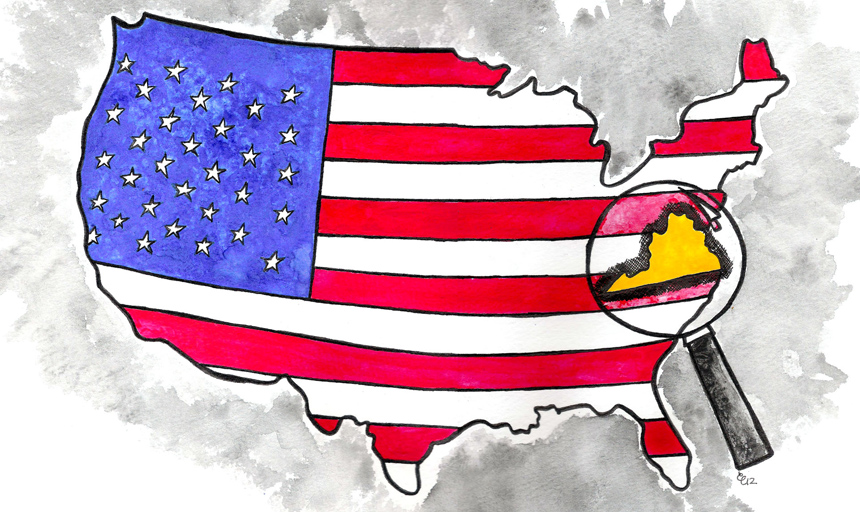RC Poll: Profile of the Tea Party in Virginia
January 04, 2011

As part of a recent survey conducted by the Institute for Policy and Opinion Research at Roanoke College 601 Virginia residents were asked if they agreed with the Tea Party, disagreed with the movement or if they did not know enough to have an opinion. About one-third (33%) agreed with the Tea Party, another third (32%) were opposed, and the final third (35%) did not have an opinion. The following analysis compares those who support the movement with those who disagree with those ideas.
Who Is the Tea Party in Virginia?
In short, they look very much like people who disagree with the Tea Party movement with regard to most demographic characteristics, but they are very conservative. In fact, they hold views very similar to those who identify themselves as ideological conservatives on most policy issues.
Those who support the Tea Party are more likely to be male (60% are males), and more likely to be white (94% are white,) but 79% who disagree are white too. In terms of education, they are more likely to have some college or have attended technical school, but they are much less likely to have a graduate degree. With regard to age, income, and region where they live, they are not significantly different from those who disagree with the movement.
In their politics, they are very conservative. In fact, 75% of them call themselves conservative; only 18% are moderate, and 5% are liberal. Those who disagree with the Tea Party are 38% liberals, 48% moderates, and 14% conservatives. Most of the supporters are Republican (55%) with fewer describing themselves as Independent (33%) or Democrat (5%). Among those who do not support the Tea Party, 60% are Democrats, 29% Independents, and 5% are Republicans. Tea Party supporters voted overwhelmingly for John McCain for President in 2008 (81%), and an even higher percentage (84%) voted for Bob McDonnell for Governor in 2009.
Views of Government
Tea party supporters are about the same as others in terms of trust in the state government and the appropriateness of legislators' salaries, but they are slightly less likely to think that General Assembly sessions are too short. They are considerably more likely than those who disagree with the movement to think that Virginia is headed in the right direction (65%-39%) and to approve of Governor McDonnell's job performance (82%-32%).
Tea Partiers have much more negative views of the national government. Compared to those who disagree with the Tea Party, they are much more likely to say the country is headed in the wrong direction (93%-48%), more likely to trust the national government not much of the time or never (74%-26%), and to disapprove of President Obama (86%-14%).
Supporters are more likely than those who disagree with the Tea Party to think that government is trying to do things better left to individuals and businesses (85%-29%) and to prefer a smaller government with fewer taxes (94%-33%).
Not surprisingly, they were far more likely to support the so-called "Repeal Amendment," which would give states the authority to nullify federal laws (82%-29%).
Tea Party supporters are slightly more likely to have voted for John McCain and Bob McDonnell, have positive views of Governor McDonnell and Virginia government, and have negative views of President Obama and the national government when compared to those who identify themselves as conservatives.
Issues
Tea party supporters are generally more supportive of measures to "get tough" with illegal immigrants, even when it means increasing the powers of government. While the margin varied, they were more supportive of all measures than those who disagree with the Tea Party.
Tea party supporters are much more likely to see health care as an individual responsibility, are unwilling to pay higher taxes for universal health care, and think that the uninsured should be responsible for their own health care.
They are far more likely to support budget cuts as a means of balancing the budget, and they are even more willing to sustain cuts to programs that benefit them or their families. They are significantly more likely to support cuts in education, health and human services, and across-the-board cuts, but only slightly more likely to support cuts in public safety.
Tea partiers are much more likely to oppose increases in most taxes-personal income, business income, gas, tax, and personal property tax reimbursements to localities-but not as strongly opposed to an increase in the sales tax. In most issues, the differences between those who support or oppose the Tea Party are stark...but so are the differences between conservatives and liberals.
On virtually every policy issue, those who support the Tea Party are not significantly different from those who call themselves conservative.
Methodology
Interviewing for The Roanoke College Poll was conducted by The Institute for Opinion and Policy Research at Roanoke College in Salem, Va. between November 29 and December 8, 2010. The sample consisted of 601 residents of Virginia. The sample of phone numbers was prepared by Survey Sampling Inc. of Fairfield, Conn. and was created so that all residential telephone numbers, including unlisted numbers, had a known chance of inclusion.
Questions answered by the entire sample of 601 likely voters are subject to a sampling error of plus or minus approximately 4 percent at the 95 percent level of confidence. This means that in 95 out of 100 samples like the one used here, the results obtained should be no more than 4 percentage points above or below the figure that would be obtained by interviewing all registered voters who have a telephone. Where the results of subgroups are reported, the sampling error is higher.
A copy of the questions and all frequencies may be found on the Roanoke College web site.
For more about the Institute for Public Opinion Research, click here.
CONTACT: Dr. Harry L. Wilson, Director, IPOR
(540) 375-2415 (Office)
wilson@roanoke.edu